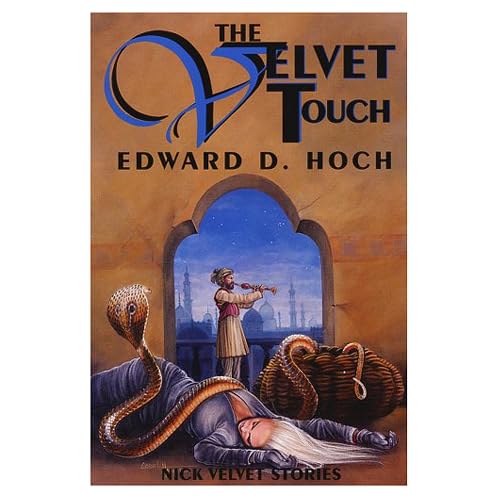 Edward D. Hoch wrote hundreds of short stories. I’ve always harbored a fondness for Hoch’s “Nick Velvet” adventures. Nick Velvet is a master thief. But he’s a thief with a strange quirk: he only steals items that have no value. In The Velvet Touch Nick Velvet steals a bald man’s comb, an overdue library book, a menu, and several other seemingly valueless objects. These clever stories entertain and delight. Crippen & Landru should be praised for keeping these wonderful adventures in print. Don’t miss them.
Edward D. Hoch wrote hundreds of short stories. I’ve always harbored a fondness for Hoch’s “Nick Velvet” adventures. Nick Velvet is a master thief. But he’s a thief with a strange quirk: he only steals items that have no value. In The Velvet Touch Nick Velvet steals a bald man’s comb, an overdue library book, a menu, and several other seemingly valueless objects. These clever stories entertain and delight. Crippen & Landru should be praised for keeping these wonderful adventures in print. Don’t miss them.
Monthly Archives: November 2009
WILD HARMONIES: A LIFE OF MUSIC AND WOLVES By Helene Grimaud
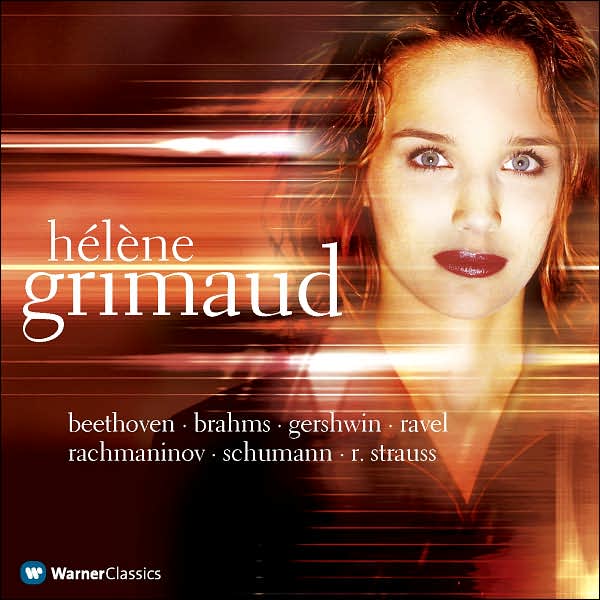
Art Scott lavished praise on Helene Grimaud’s performance of Brahms Op. 116-119. Unfortunately, that CD is unavailable. The only way to obtain it is to buy the Helene Grimaud box set. So I did. After listening to Grimaud play Brahms I’m willing to admit Art might be right in his assessment of Grimaud’s scintillating performance. Art also sent me some pages from Grimaud’s memoir, Helene Grimaud: A Life of Music and Wolves where she discusses her approach to Brahms on the piano. “As soon as I heard a work by Brahms…I had a sense of recognition. It was very bizarre–the feeling that something had been written for you, and this something corresponded exactly to the fluctuations of your emotions…. I think I play Chopin fairly well, but I never reached the same degree of intimacy with him that I did with Brahms.” So I read her book. Grimaud’s insights are as passionate as her playing. Her obsession with wolves and her antipathy toward men made her memoir gripping. If you’re interested in the life of one of the finest pianists in the world read her book; if you want to listen to some great classical music, buy her box set. GRADE: A (for both the book and the music)
THE FALL By Norah Jones
 As soon as I saw the hound on the CD cover, I should have known Norah Jones’ new album would be a dog. Eschewing her mellow, jazzy sound that made her previous three CDs hits, Norah has assembled a new band and channeled Tom Waits to produce a grittier, louder, more funky album. Not to my taste. GRADE: C
As soon as I saw the hound on the CD cover, I should have known Norah Jones’ new album would be a dog. Eschewing her mellow, jazzy sound that made her previous three CDs hits, Norah has assembled a new band and channeled Tom Waits to produce a grittier, louder, more funky album. Not to my taste. GRADE: C
TIME TRAVELERS NEVER DIE By Jack McDevitt
 Jack McDevitt is best known for his science fiction with an archeological basis like his award-winning Seeker. Now, McDevitt tackles time-travel in Time Travelers Never Die. A son and his linguist friend chase his Nobel-Prize winning father through time. Yes, meeting famous people from the past on nearly every page gets to be a bit much, and the book is a tad too long for the story it’s trying to tell, but I enjoyed the adventure. If you’re a fan of time travel novels, you’ll enjoy Time Travelers Never Die. GRADE: B
Jack McDevitt is best known for his science fiction with an archeological basis like his award-winning Seeker. Now, McDevitt tackles time-travel in Time Travelers Never Die. A son and his linguist friend chase his Nobel-Prize winning father through time. Yes, meeting famous people from the past on nearly every page gets to be a bit much, and the book is a tad too long for the story it’s trying to tell, but I enjoyed the adventure. If you’re a fan of time travel novels, you’ll enjoy Time Travelers Never Die. GRADE: B
BARGAIN OF THE WEEK: THE LITTLE PENGUIN PINOT NOIR
 No, I’m not a wine connoisseur. I’m just a guy whose doctor told him to drink a glass of red wine every day to help my blood pressure and cholesterol numbers. My usual red wine is a cabernet sauvignon from Rutherford Ranch. But that runs about $15 a bottle. Last week, Diane and I were dining at our favorite local restaurant, The Hideaway Grill, and our favorite waitress, Catherine, suggested The Little Penguin Pinot Noir that they had just started carrying. I tried it out and liked it. The next day, I went to my local liquor store and found The Little Penguin Pinot Noir costs a mere $7 a bottle. I’m going to try the other wines put out by The Little Penguin: Shiraz, Chardonnay, Merlot, Cabernet Sauvignon, Pinto Grigio, Cabernet Merlot, and Shiraz Cabernet. You can check all this out at www.The Little Pengin.com.
No, I’m not a wine connoisseur. I’m just a guy whose doctor told him to drink a glass of red wine every day to help my blood pressure and cholesterol numbers. My usual red wine is a cabernet sauvignon from Rutherford Ranch. But that runs about $15 a bottle. Last week, Diane and I were dining at our favorite local restaurant, The Hideaway Grill, and our favorite waitress, Catherine, suggested The Little Penguin Pinot Noir that they had just started carrying. I tried it out and liked it. The next day, I went to my local liquor store and found The Little Penguin Pinot Noir costs a mere $7 a bottle. I’m going to try the other wines put out by The Little Penguin: Shiraz, Chardonnay, Merlot, Cabernet Sauvignon, Pinto Grigio, Cabernet Merlot, and Shiraz Cabernet. You can check all this out at www.The Little Pengin.com.
THE PRISONER (AMC PREMIER)
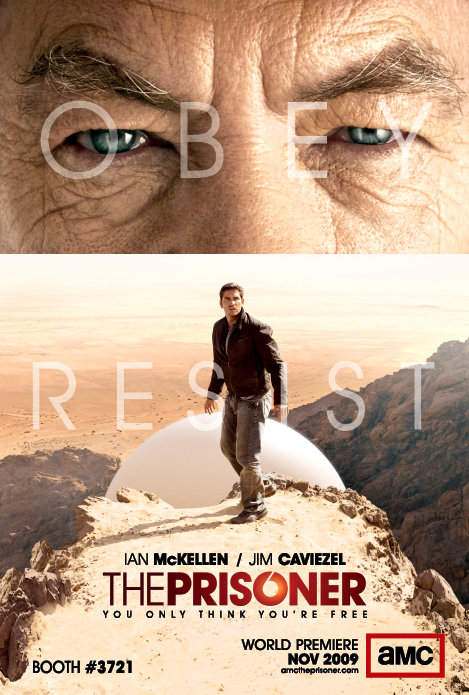 Premiering tonight on AMC is the re-make of the classic Patrick McGoohan series. Now we have Jim Caviezel as Number Six and Ian McKellen as Number Two. For those of you who have been hiding under a rock, Caviezel plays a former spy who decides to “retire.” He’s captured, drugged, and wakes up in a bizarre place known as The Village. If this remake series follows the original series, Caviezel will spend most of his time plotting an escape and trying to figure out who’s running the Village: his former employers or some enemy state. A few weeks ago, I started watching the original The Prisoner (also available for viewing FREE on AMC’s web site). The sixteen episodes vary in entertainment. Some of them are startlingly compelling, others are tedious. I’ll let you judge the final, surreal episode for yourself. I’ll be watching the new series tonight.
Premiering tonight on AMC is the re-make of the classic Patrick McGoohan series. Now we have Jim Caviezel as Number Six and Ian McKellen as Number Two. For those of you who have been hiding under a rock, Caviezel plays a former spy who decides to “retire.” He’s captured, drugged, and wakes up in a bizarre place known as The Village. If this remake series follows the original series, Caviezel will spend most of his time plotting an escape and trying to figure out who’s running the Village: his former employers or some enemy state. A few weeks ago, I started watching the original The Prisoner (also available for viewing FREE on AMC’s web site). The sixteen episodes vary in entertainment. Some of them are startlingly compelling, others are tedious. I’ll let you judge the final, surreal episode for yourself. I’ll be watching the new series tonight.
CELLULOID COPLAND: WORLD PREMIERE FILM MUSIC
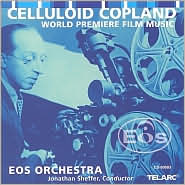 Although I’m a fan of Aaron Copeland’s music, I found this CD of his “lost” film music pretty much a bore. Music Copeland wrote to accompany “From Sorcery to Science,” “The City (Suite),” “The Cummington Story (Suite, Arr Sheffer),” and “The North Star (Suite)” sounds too brassy to my ears. The Eos Orchestra plays these pieces well, but the result is a dull sameness. The CD lasts about an hour, but I found myself constantly looking at my watch. GRADE: C
Although I’m a fan of Aaron Copeland’s music, I found this CD of his “lost” film music pretty much a bore. Music Copeland wrote to accompany “From Sorcery to Science,” “The City (Suite),” “The Cummington Story (Suite, Arr Sheffer),” and “The North Star (Suite)” sounds too brassy to my ears. The Eos Orchestra plays these pieces well, but the result is a dull sameness. The CD lasts about an hour, but I found myself constantly looking at my watch. GRADE: C
FORGOTTEN BOOKS #43: THE SILVER EGGHEADS By Fritz Leiber
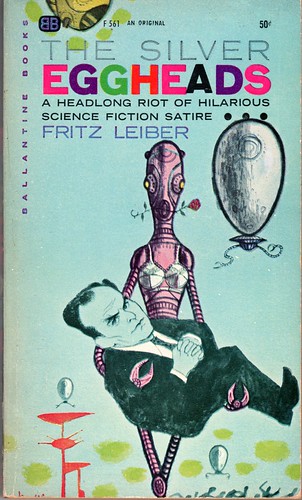 Imagine a world where computers write the books and authors are mere marketing devices to help sell the product. This is the world Fritz Leiber imagined nearly 50 years ago. Leiber, a brilliant writer and innovator, wrote SF like the Change War series where agents of the future battle to change the timeline (or protect it). His most famous work was the Fafard and Gray Mouser series of sword-and-sorcery adventures. But Leiber, ever the innovator, came up with the concept of The Silver Eggheads which seems to be coming to fruition in the near future. Until then, we have real writers who actually write the books they hawk to the reading public. Let’s celebrate them until the computers take over writing the books as Leiber predicted.
Imagine a world where computers write the books and authors are mere marketing devices to help sell the product. This is the world Fritz Leiber imagined nearly 50 years ago. Leiber, a brilliant writer and innovator, wrote SF like the Change War series where agents of the future battle to change the timeline (or protect it). His most famous work was the Fafard and Gray Mouser series of sword-and-sorcery adventures. But Leiber, ever the innovator, came up with the concept of The Silver Eggheads which seems to be coming to fruition in the near future. Until then, we have real writers who actually write the books they hawk to the reading public. Let’s celebrate them until the computers take over writing the books as Leiber predicted.
THE ROBERT FROST READER
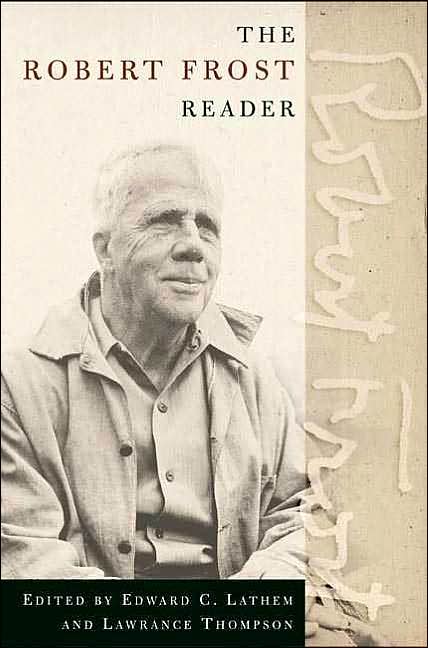 “No surprise in the writer, no surprise in the reader,” wrote Robert Frost. While much 20th Century poetry trended to confessional styles and obscurity, Robert Frost’s poetry dazzled readers with its clarity and depth. What most readers of Frost’s poetry don’t know is that Frost also wrote eloquently about poetry and the writing of poetry. That’s why I’m recommending this collection. It contains many of Frost’s best poems plus his best essays on his craft. There are plenty of surprises in Frost. His deceptively simple style hides some deep thoughts. Ponder this short poem:
“No surprise in the writer, no surprise in the reader,” wrote Robert Frost. While much 20th Century poetry trended to confessional styles and obscurity, Robert Frost’s poetry dazzled readers with its clarity and depth. What most readers of Frost’s poetry don’t know is that Frost also wrote eloquently about poetry and the writing of poetry. That’s why I’m recommending this collection. It contains many of Frost’s best poems plus his best essays on his craft. There are plenty of surprises in Frost. His deceptively simple style hides some deep thoughts. Ponder this short poem:
THE HARDSHIP OF ACCOUNTING
Never ask of money spent
Where the spender thinks it went
Nobody was ever meant
To remember or invent
What he did with every cent.
But accounting for the money is EXACTLY what accounting was invented to do! So what is Frost getting at in this poem? I like to point out to my Accounting students that they have a herculean task when they attempt to keep track of funds when the spirit of most of the spending people in the organization is “Who cares?” I like to think Frost is saying people don’t like to account for their money or their actions. But, somebody has to. Or should we be living our lives not worrying about accounting for our actions. Either way, this short poem has generated plenty of thought and discussion in my classes over the years. And, that’s just the tip of the Robert Frost iceberg. GRADE: A
VETERANS DAY

